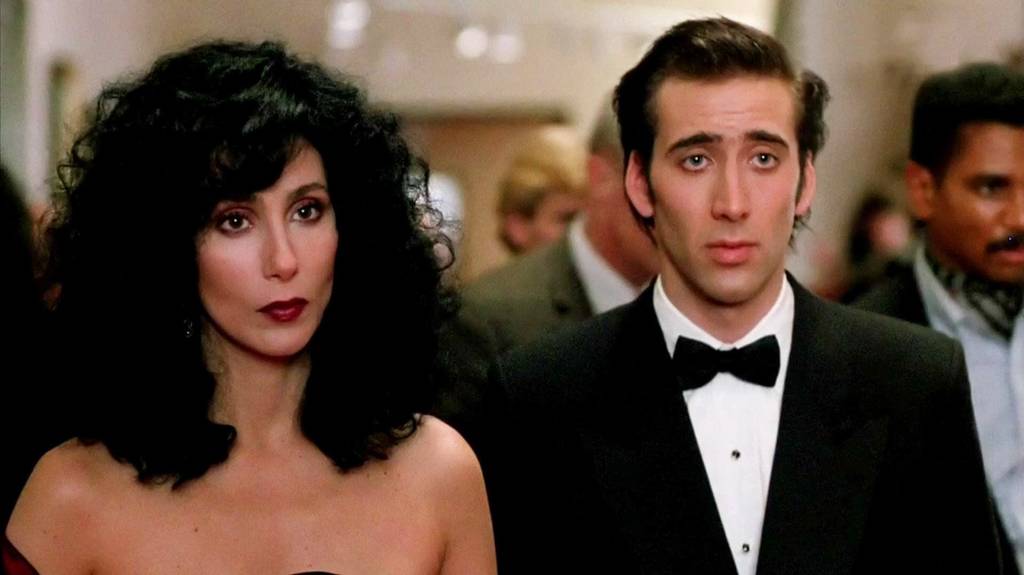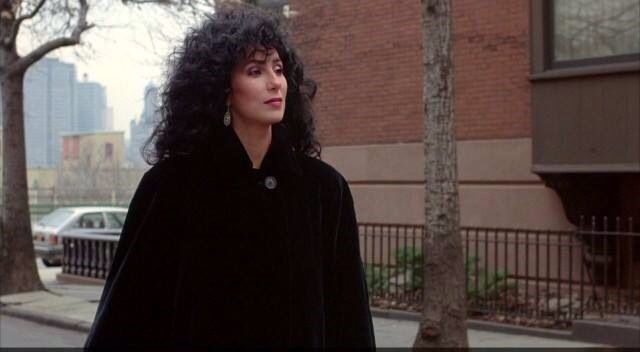Curses, bad luck, and the special powers of the moon all emerge at one point or another in Norman Jewison’s magical Moonstruck (1987), almost providing audience members with the same viewing experience they would have with a fantasy film. Yet, the film excels as one of cinema’s most polished and revered romantic comedies, with the American Film Institute listing it as the eighth best romantic comedy in its “10 Top 10” list dedicated to the genre. Moonstruck flourishes due to the undeniably engrossing leading love interests Loretta Castorini (Cher), a self-assured Italian American widow residing in Brooklyn Heights, and Ronny Cammareri (Nicolas Cage), a volatile yet tender-hearted bakery worker, as the pair irrationally fall head over heels in a passion-induced night lit by a spell of the full moon. Despite Loretta’s engagement to Ronny’s estranged brother, Johnny Cammareri (Danny Aiello), she is still unexplainably smitten with Ronny, making for an irresistibly appealing plot.
The film shines as an off-beat romance due to its mystical nature supporting the various love tales throughout. Moreover, its authentic depiction of Italian culture and family dynamics stands as the film’s distinguishing characteristic, albeit a bit cartoonish sometimes. Yet this particular quality is what’s most humorous in Moonstruck, especially apparent in the final kitchen scene’s over the top glory. Similar to the final act of a play, the film’s main characters enter the scene and assist in resolving major plot conflicts, all while delivering their finest comedic performances of one-liners and outbursts. Though at different points vociferous and overzealous, this scene nonetheless offers a fun and heartwarming way to close the film, making for one of the most memorable endings in a romantic comedy, and in cinema altogether.
In Moonstruck’s final act, and throughout the film, the superb acting performances from its ensemble cast are beaming standouts, such as Cage’s explosive introductory scene in which he reveals his wooden prosthetic hand to Loretta and furiously blames his brother for his missing limb in a moment of distraction, thus losing his (at the time) fiancé. Also, there’s Aiello’s precise comedic timing, and Vincent Gardenia’s convincing role as Cosmo, Loretta’s assertive father. While the men certainly have outstanding roles, the women’s prove superior, with both of the film’s leading ladies going on to win Academy Awards for their dazzling performances. Cher is quite astonishing as a strong-willed female lead, surfacing as one of the earlier pop stars to arise as an Oscar-worthy actress and helping to break down barriers for other singers (like, most recently, Lady Gaga and her 2018 role in A Star is Born). Additionally, then-off-Broadway star Olympia Dukakis, who plays Loretta’s outspoken mother, Rose Castorini, captivates in each of her scenes, offering such a natural dominant presence. She possesses the knowledge of her husband Cosmo’s infidelity, to which she never confronts him about until the end of the film. Instead, she attempts to find out the reason why men chase after women. Specifically, when Rose decides to have dinner with a college professor, Perry (John Mahoney), she asks him the burning question, already having her own answer and suggesting that men chase women because they fear death. Perry has a rather non-essential role to the overall plot, and his role as a male only exists within the narrative to uplift Rose’s and help her develop her own conclusions about love.
Indeed, Moonstruck includes plenty of humorous moments in its beginning half, especially due to characters’ witty remarks, as well as absurdly comical moments, like the time Loretta spouts at Ronny her belief that he is, metaphorically, a wolf who cut off his own hand. Yet when entering the second half, the jokes arrive at a slower pace with the building up to the film’s finale, causing the latter scenes to fall flat on delivering humor. We still receive some sentimental moments, and, fortunately, are granted the dramatic and hilarious climax at the family table, making the scenes that precede it worthwhile. More critically, though, Cher and Cage’s chemistry as two supposedly lovestruck characters is not as convincing as some audience members would imagine. Individually, their acting radiates, and even their scenes together prove most delightful, yet there seems to be an insufficiency of romantic spark between the pair. Perhaps my incredulity results from the actors’ eighteen-year age gap at the time of filming, or their limited amount of scenes together. Yet their love affair still plays out engagingly. Moonstruck thrives off the impetuous and miraculous nature of the plot, such as Loretta and Ronny’s complete enamor for one another only after spending a few hours together. One may deem their dalliance as unrealistic, but their sudden infatuation is a part of their charm. Moreover, we feel anticipation and excitement to see how Loretta and Ronny’s relationship follows through with the forbidden love trope—their attraction, a secret because of Loretta’s engagement to Johnny–: how will the amorous romance unfold? The combination of riveting, outsized performance and romantic suspense keeps our eyes glued to the screen.
The mesmerizing beauty of the one and only Cher as Loretta Castorini certainly steals the show, perhaps even for some the motivation to view the film. Her practically-bare, natural appearance in the first half calls for us to focus our attention on her perfectly-sculpted cheek bones and almond-shaped eyes, even as the film attempts to make her look a bit drab with her dull colored garments and pinned-back hair. Loretta finally decides to let her hair down, though, in a spontaneous makeover before her romantic rendezvous with Ronny to see La bohème, an opera composed by Giacomo Puccini. Big, luscious curls, a deep red lip, and a stunning wine-red gown comprise her new sultry look, signifying her transformation from a woman relying on her traditional superstitions in life, to a more confident one, embracing herself and taking control of her own love life without depending on otherworldly notions. Moonstruck privileges its audience in showcasing Loretta’s allure both before and after her makeover. She’s always beautiful, whether as a subdued yet earthy heroine or a glammed-up diva, but what’s most attractive, even more so than her ethereal looks, is her decision to get a makeover merely for herself, rather than to impress her male love interest, making for a refreshing and empowering take on the makeover trope that typically appears in romantic comedies.
Cher and Dukakis offer power to their characters, calling the shots in their relationships and authoring their own roles as women through their romances. Their presence in the film proves all the more fulfilling in that they both find their happy ending; Rose gets the upper hand when she firmly demands Cosmo end his affair, after which the couple reunites, and Loretta finally gets to be with the one she truly loves. Interestingly enough, both Cosmo and Loretta, having cheated on their partners, still receive a positive outcome after committing to adultery, begging the question of whether Moonstruck justifies infidelity. Nonetheless, the magical and strange concept of being spellbound by the moon reveals the true complexity of love as it manifests in people’s lives, young and old.
Criterion’s Blu-Ray edition of Moonstruck includes a substantial number of special features, with eleven separate supplements available for viewers’ enjoyment. Three individual 1987 Today show interviews with cast members, an archival interview with director Norman Jewison, and feature-length audio commentary from Cher, Jewison, and screenwriter John Patrick Shanley are among the extra additions, with the latter offering considerable insight into the perfectly crafted script. Additionally, in a video interview, literature and cinema scholar Stefano Albertini discusses how opera contributes to Moonstruck’s unique tone: “The soundtrack plays a very important role in Moonstruck. It’s always a commentary, and in some cases, it becomes a character.” Perhaps one of the most gripping features that comes packaged in this ample Blu-Ray release is Emily VanDerWerff’s 2020 essay, “Moonstruck: Life in the In-Between,” praising the film’s ability to depict the true process of woman’s transformation: “Few makeover sequences still hold their power for me now, but the one in Moonstruck does, because it understands all the ways that changing into one’s own self is undertaken alone, and it understands all the power of first seeing who you really are in the mirror, long before anybody else can see you.” Through her writing, she commends Loretta’s makeover sequence, not only for its compelling approach of the sometimes-trite trope, but also for its revelation of the process toward womanhood, saying that women must discover their own worth by themselves in order to grow as a person and know what they truly desire out of love and life. VanDerWerff’s captivating and vulnerable essay is also available for free on Criterion’s site, but you’ll still want to purchase this copious Blu-ray release; with such an abundance of features at hand, you’re sure to get your money’s worth.
Moonstruck is an ode to women, efficiently giving its female characters the space to grow and see their own merit, as VanDerWerff points out. Loretta does act unfaithfully to Johnny, after which she immediately feels guilty, showing that the film does not justify infidelity; rather, Moonstruck tells its audience that individuals are flawed when it comes to the complicated game of love. As Rose Castorini always knew, people cheat due to their fear of death, and commit to love fast and passionately before time is up. Moonstruck, even more than an empowering experience for its female audience, is a bizarre and unique romance that verges on fantasy, providing heartwarming moments while also exhibiting the complexities of love through magical realism. We do not necessarily need superstitions to define our love lives, as Loretta eventually realizes, but perhaps it is easier to believe in them knowing we aren’t guaranteed an everlasting life. Hopefully, in our vanishing lifetimes, we can all encounter the spell of the illuminating and eternal moon, so that we may find a seemingly eternal and life-affirming love.
For more information about this Criterion title, please visit: https://www.criterion.com/films/29154-moonstruck





































